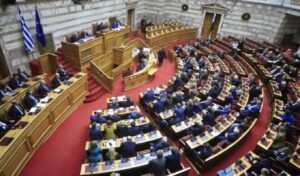The government treats Alexis Tsipras’ resignation from his parliamentary position and the immediate prospect of creating a new party under his leadership as an issue concerning the Left. “Mr. Tsipras is a Piraeus MP for SYRIZA” was the laconic response Kyriakos Mitsotakis gave the last time he was publicly asked to comment on the matter, adding that he “might remind one of an athlete who ‘burns out’ during warm-up,” a jab at the months-long discussion about the possibility of a new party under Tsipras.
The Prime Minister reportedly expressed the view at an unsuspecting time that Alexis Tsipras appears interested in the Center space –at least as shown by his so-called rebranding effort–, but centrist voters don’t seem interested in Alexis Tsipras. In other words, Mitsotakis doesn’t see electoral competition from whatever new party the former Prime Minister eventually creates in the Center space, where he believes the election outcome is ultimately decided.
Pavlos Marinakis outlined the government’s three-axis positioning regarding this political development during his briefing with political editors. The first axis is that the Center-right space, to which New Democracy belongs, is not concerned with what happens in another political space, that of the Left. The second axis essentially devalues Tsipras’ presence and actions in the period after his resignation from SYRIZA leadership, as in the last two years as a simple MP “he didn’t make any speech, intervention in the Plenary, any question,” as the government spokesperson noted. The third axis is New Democracy’s “convenient” reminder of Tsipras’ record during his premiership, since after that period –with Tsipras as the main opponent– ND achieved two victories in the 2019 and 2023 electoral contests.
“I remembered a statement by Mr. Tsipras in June 2015, if I’m not mistaken, in St. Petersburg at a Forum, and I searched and found it to be precise: ‘We are in the middle of a great storm,’ he had said then, ‘but we are a people of the sea who know how to emerge from storms and are not afraid to venture into new seas to reach new safe harbors.’ So, the last time Tsipras had spoken about harbors, seas and storms, we were all looking for a life preserver. Because I remind you that capital controls followed, closed banks, the divisive referendum, and our country was burdened with over 100 unnecessary billions,” Marinakis noted.
As Kyriakos Mitsotakis had emphasized in a television interview in early summer, “Mr. Tsipras is a politician who has a past, whether he has a future will be judged by the citizens. He certainly has a past, however, and a very specific past.”
At the same time that this assessment of Tsipras’ moves is being made at the Maximos Mansion, the evaluation of the other former Prime Minister and former ND president, Antonis Samaras, is interesting. Following statements by a series of government and party officials, Marinakis was asked about this during the political editors’ briefing and extended an “olive branch” again. “Well, when you answer that it’s a development you didn’t pursue, that it’s an unpleasant development and that it’s something that can’t be pleasant for anyone as a fact that the former Prime Minister left, obviously none of us is negative about a former president returning. We’ve said this many times,” was his characteristic phrase, indicative of a clearly less cold climate compared to the recent past.




